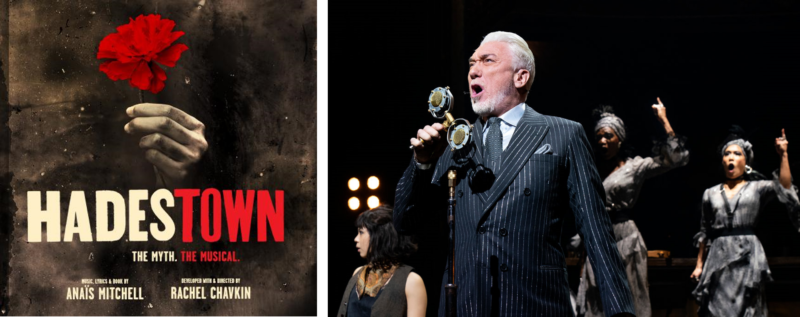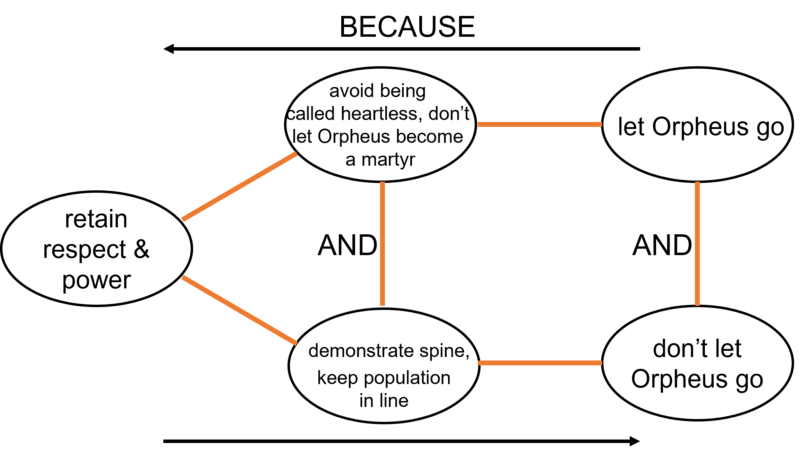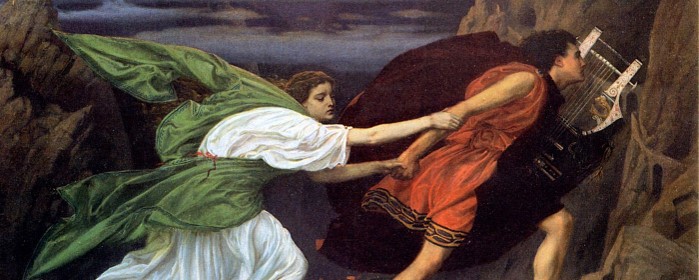
Aah, Joseph Campbell. The Hero’s Journey. The DNA of successful literature. Literature that survives through the centuries. A DNA that has contradiction resolution – ‘The Ordeal’ – at its heart. Like the story concerning the fateful love of Orpheus for the beautiful Eurydice. A universal tragedy currently on show as a Broadway musical by one of my all-time favourite artists, Anaïs Mitchell (Reference 1). In Mitchell’s version of the story, one of the most vivid Ordeals comes to king of the underworld, Hades: Orpheus enters hell (‘Hadestown’) in order to rescue Eurydice, who has been seduced by Hades. Should Hades allow Orpheus to leave with Eurydice or not? Here’s how his dilemma is introduced in the musical:
Gotta think quick
Gotta save face
Caught ‘tween a rock and a hard place
What you gonna do?
What you gonna do?
What you gonna do?
What you gonna do now?
If you tell ‘em no, oh, you’re a heartless man
And you’re gonna have a martyr on your hands
If you let ‘em go, oh, you’re a spineless king
And you’re never gonna get ‘em in line again
Damned if you don’t
Damned if you do
Whole damn nation’s watching you
What you gonna do?
What you gonna do?
What you gonna do?
What you gonna do now?
Here’s what Hades’ contradiction looks like in terms of our rather less poetic bubble-map:

By way of helping Hades to resolve his contradiction, the overseeing ‘Fates’ characters offer up a clue:
Here’s a little tip
Word to the wise
Here’s a little snippet of advice
Men are fools
Men are frail
Give them the rope and they’ll hang themselves
And here’s the equivalent set of clues offered by the again less poetic Contradiction Matrix:

We then hand over to narrator, Hermes, revealing to Orpheus, Eurydice and the surrounding ‘Workers’ how Hades decided to solve his contradiction:
Hermes: Well, the good news is, He said that you can go
Eurydice: He did?
Orpheus & Workers: He did?
Hermes: He did…, There’s bad news though
Eurydice: What is it?
Hermes: You can walk… But it won’t be like you planned
Orpheus: What do you mean?
Eurydice: Why not?
Hermes: Well, you won’t be hand in hand, You won’t be arm in arm, Side-by-side and all of that. (to Orpheus) he said you have to walk in front, And she has to walk in back
Orpheus: Why?
Hermes: And if you turn around, To make sure she’s coming too, Then she goes back to Hadestown, And ain’t nothing you can do
Eurydice: But why?
Hermes: Why build walls? Make folk walk single file? Divide and conquer’s what it’s called
Orpheus: It’s a trap?
Hermes: It’s a trial. Do you trust each other? Do you trust yourselves?
Orpheus & Eurydice: We do
Hermes: Well, listen, brother, If you wanna walk outta hell, You’re gonna have to prove it Before gods and men. Can you do that?
Orpheus & Eurydice: We can
Hermes: Alright… time to go
Orpheus: Mister Hermes!
Hermes: Yes?
Orpheus: It’s not a trick?
Hermes: No – It’s a test
Hades’ solution, his metaphorical (Principle 24, Intermediary) ‘rope’, was to force a (Principle 10, Preliminary Action) pre-condition on Orpheus: a trial.
One that, since the myth is a tragedy, Orpheus somehow manages to fail. But that’s another contradiction. Maybe for another day.

Reference
- Mitchell, A., ‘Working On A Song: The Lyrics Of Hadestown’, Plume, 2020.
